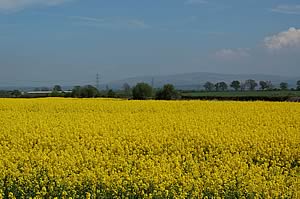15/07/06
Easier and faster harvesting has become a key priority for oilseed
rape growers across the country, according to the first-ever national
study of oilseed rape harvesting practice.
Conducted by Masstock, as part of its leading Best of British
Oilseeds initiative to improve crop output and profitability, the
study involved a representative sample of over 280 growers across
more than 40 counties in England and Scotland. In total,
they harvested nearly
40 different OSR varieties in 500 separate crops spread over 50,000 acres (20,000
ha) in 2005 using combines of seven different makes and a vast range of sizes
and specifications.
Fully 75% of the crops were totally or mostly direct combined
last season – increasing to nearly 85% with low biomass types – with
a clear move away from swathing recorded over the past five years,
and two thirds of growers desiccating the bulk of their crops with
Roundup.
“The overwhelming majority of growers (97%) consider oilseed
rape harvesting ease and speed important to their businesses, with
69% rating it very important,” reported study
co-ordinator, David Langton. “This isn’t surprising
given their growing reliance on the crop
and need to clear increasing acreages of it as efficiently as possible
ahead of wheat harvesting and drilling.
“Just under 70% identify lower harvesting costs – including
both fuel and labour savings – as a key benefit of direct
combining, with quicker combining and reduced contractor use valued
by more than a third of growers and more reliable harvesting, lower
harvesting losses and more timely harvesting also mentioned by
many.
“The value of reliable desiccation is underlined by much greater proportions
of those using Roundup reporting benefits in all these respects,” he
adds.
Reflecting the generally good harvesting conditions of last summer,
only 11% of OSR crops caused growers in the Masstock study any
real harvesting difficulties in 2005, with 44% judged very easy
to harvest with no problems.
Even so, there was a clear difference in harvestability between
different crop types. Over 60% of the low biomass varieties Castille,
Caracas and Canberra were rated very easy to harvest, with just
6% causing any difficulty. In contrast only 28% of high biomass
types like Winner, Toccata and Royal were found to present no problems
with 19% giving some difficulties.
“This difference was also reflected in combining speed,” notes
David Langton. “Of the crops all or mostly direct cut, 44% of low biomass
varieties were combined at more than 4 acres/hour, compared to just 35% of
high biomass ones
“Interestingly too, a noticeably higher proportion of those desiccating
all or most of their OSR with Roundup combined at higher speeds than those
not using the desiccant. As did more of those using Claas combines as against
other makes.”
The majority of Masstock growers pinpointed lodged and tall crops
as the two principal reasons for any harvesting difficulties, with
uneven ripening and uneven crops also cited as important factors
by more than 30%.
They identified the three low biomass varieties, Castille, Caracas
and Canberra as by far the easiest to combine varieties over the
years and high biomass Winner clearly the least easy, with other
varieties in between. And they went on to establish lodging resistance
and short stems as the two most important considerations in variety
selection for ease and speed of harvesting.
“Our study confirms harvestability is something more and
more growers are looking for in their oilseed rape these days,” stresses
David Langton. “It’s becoming more important because
they have larger acreages to deal with, fewer men and machines
available and less capacity to tolerate risk. And, of course, controlling
costs is at least as vital as maximising output.
“Our work also shows that, as with other critical areas of oilseed rape
improvement, faster and easier harvesting demands attention to a number of
different aspects of crop management at the same time. Low biomass varieties
are an obvious advantage in this respect, as is Roundup desiccation. But the
type of combine also appears to be a significant consideration. As, indeed,
is the whole complex business of achieving the correct plant population and
canopy structure in the first place.”
 Crop
Market Update from Gleadell Crop
Market Update from Gleadell
 Claas Gear-Up For Challenging OSR Harvest Claas Gear-Up For Challenging OSR Harvest
 Arable Units Face Acute Autumn Weed Control Dilemma Arable Units Face Acute Autumn Weed Control Dilemma
 Winter oilseed rape crops on track for average harvest Winter oilseed rape crops on track for average harvest
|


